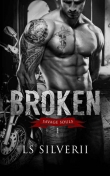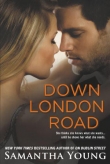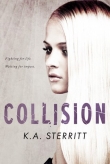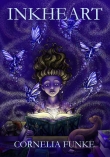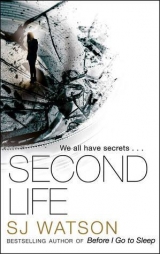
Текст книги "Second Life"
Автор книги: S. J. Watson
Жанр:
Триллеры
сообщить о нарушении
Текущая страница: 1 (всего у книги 24 страниц)
ABOUT THE BOOK
The sensational new psychological thriller from the bestselling author of Before I Go To Sleep . . .
She loves her husband.
She’s obsessed by a stranger.
She’s a devoted mother.
She’s prepared to lose everything.
She knows what she’s doing.
She’s out of control.
She’s innocent.
She’s guilty as sin.
She’s living two lives.
She might lose both.
Contents
Cover
About the Book
Title Page
Dedication
Epigraph
Part One
Chapter One
Chapter Two
Chapter Three
Chapter Four
Chapter Five
Chapter Six
Chapter Seven
Chapter Eight
Chapter Nine
Part Two
Chapter Ten
Chapter Eleven
Chapter Twelve
Chapter Thirteen
Chapter Fourteen
Chapter Fifteen
Chapter Sixteen
Part Three
Chapter Seventeen
Chapter Eighteen
Chapter Nineteen
Chapter Twenty
Chapter Twenty-One
Chapter Twenty-Two
Part Four
Chapter Twenty-Three
Chapter Twenty-Four
Chapter Twenty-Five
Chapter Twenty-Six
Chapter Twenty-Seven
Chapter Twenty-Eight
Part Five
Chapter Twenty-Nine
Chapter Thirty
Chapter Thirty-One
Chapter Thirty-Two
Chapter Thirty-Three
Acknowledgements
About the Author
Also by S J Watson
Copyright
SECOND LIFE
S J Watson
For Alistair Peacock, and for Jenny Hill
If repression has indeed been the fundamental link between power, knowledge, and sexuality since the classical age, it stands to reason that we will not be able to free ourselves from it except at a considerable cost.
Michel Foucault
God guard me from those thoughts men think
In the mind alone
W. B. Yeats
PART ONE
Chapter One
I climb the stairs but the door is closed. I hesitate outside it. Now I’m here, I don’t want to go in. I want to turn round, go home. Try again later.
But this is my last chance. The exhibition has been on for weeks and closes tomorrow. It’s now or never.
I close my eyes and breathe as deeply as I can. I concentrate on filling my lungs, I straighten my shoulders, I feel the tension in my body evaporate as I breathe out. I tell myself there’s nothing to be worried about, I come here regularly – to meet friends for lunch, to catch the latest exhibitions, to attend lectures. This time is no different. Nothing here can hurt me. It’s not a trap.
Finally I feel ready. I push open the door and go in.
The place looks exactly as it always does – off-white walls, a polished wooden floor, spots in the ceiling that hang off tracks – and though it’s early there are already a few people wandering around. I watch for a minute as they pause in front of the pictures, some standing further back to get a better view, others nodding at a companion’s murmured comment or examining the printed sheet they’ve picked up downstairs. The atmosphere is one of hushed reverence, of calm contemplation. These people will look at the photographs. They will like them, or not, then they will go back outside, back to their lives, and in all likelihood they will forget them.
At first I allow myself only a glance at the walls. There are a dozen or so large photos hung at intervals, plus a few smaller ones between them. I tell myself I could wander around, pretend to be interested in them all, but today there’s only one photograph I’ve come to see.
It takes me a moment to find it. It’s hung on the far wall, at the back of the gallery, not quite in the centre. It’s next to a couple of other shots – a full-length colour portrait of a young girl in a torn dress, a close-up of a woman with kohl-rimmed eyes smoking a cigarette. Even from this distance it looks impressive. It’s in colour, though it was taken in natural light and its palette is mostly blues and greys, and blown up to this size it’s imposing. The exhibition is called ‘Partied Out’, and even though I don’t look at it properly until I’m just a few feet away I can see why this picture is in such a prominent position.
I haven’t looked at it in over a decade. Not properly. I’ve seen it, yes – even though it wasn’t a particularly well-used photograph back then it had been featured in a couple of magazines and even a book – but I haven’t looked at it in all this time. Not close up.
I approach it obliquely, and examine the label first. ‘Julia Plummer’, it says. ‘Marcus in the Mirror, 1997, Cibachrome print’. There’s nothing else, no biographical information, and I’m glad. I allow myself to look up at the picture.
It’s of a man; he looks about twenty. He’s naked, shot from the waist up, looking at his reflection. The image in front of him is in focus, but he isn’t, and his face is thin. His eyes are narrowed and his mouth hangs slightly open, as if he’s about to speak, or sigh. There’s something melancholy in the photograph, but what you can’t see is that up until the moment before it was taken the guy in it – Marcus – had been laughing. He’d spent the afternoon in bed with his girlfriend, someone he was in love with as much as she was with him. They’d been reading to each other – Isherwood’s Goodbye to Berlin, or maybe Gatsby, which she’d read and he hadn’t – and eating ice cream from the tub. They were warm, they were happy, they were safe. A radio was playing rhythm and blues in their bedroom across the hall, and in the shot his mouth is open because his girlfriend, the woman taking the shot, was humming along and he was about to join in.
Originally the picture had been different. The girlfriend was in the frame, reflected in the mirror just over the man’s shoulder, her camera raised to her eye. She was naked, blurred out of focus. It was a portrait of the two of them, back when photographs taken in mirrors were still unusual.
I’d liked the shot like that. Preferred it, almost. But at some point – I don’t remember when, exactly, but certainly before I first exhibited it – I changed my mind. I decided it looked better without me in it. I took myself out of the picture.
I regret it now. It was dishonest of me, the first time I used my art to lie, and I want to tell Marcus I’m sorry. For everything. I’m sorry for following him to Berlin, and for leaving him there, alone in that photograph, and for not being the person he thought I was.
Even after all this time, I’m still sorry.
It’s a long time before I turn away from my picture. I don’t take portraits like that any more. It’s families now, Connor’s friends, sitting with their parents and younger siblings, jobs I pick up at the school gate. Pin money. Not that there’s anything wrong with that: I put my best effort into it, I have a reputation, I’m good. People will invite me to their children’s parties to take shots of the guests to be emailed as souvenirs; I’ve even taken the pictures at a kids’ party arranged to raise money for the hospital Hugh works at. I enjoy it, but the skill is technical; it’s not the same as making portraits like this one – it’s not art, for want of a better word, and sometimes I miss making art. I wonder if I still could, whether I still have the eye, the instinct to know when exactly to trip the shutter. The decisive moment. It’s been a long time since I really tried.
Hugh thinks I should get back into it. Connor’s older now, he’s starting to live his own life. Because of his difficult start we both threw ourselves into looking after him, but he needs us less than he once did. There’s more space for me now.
I look briefly at the other pictures on the walls. Maybe I will, soon. I could concentrate a little more on my career and still look after Connor. It’s possible.
I go downstairs to wait for Adrienne. Originally she’d wanted to come with me, to see the exhibition, but I’d told her no, I wanted to see the picture alone. She hadn’t minded. ‘I’ll just meet you in the café,’ she’d said. ‘Maybe we can grab a bite to eat.’
She’s early, sitting at a table by the window with a glass of white wine. She stands up as I approach and we hug. She’s already talking as we sit.
‘How was it?’
I pull my chair under the table. ‘A bit weird, to be honest.’ Adrienne has already ordered a bottle of sparkling water for me and I pour a glass. ‘It doesn’t feel like my picture any more.’
She nods. She knows how anxious I’ve been about coming here. ‘There’re some interesting photos up there. Will you go and take a look? Later?’
She raises her wine. ‘Maybe.’ I know she won’t, but I’m not offended. She’s seen my picture before and isn’t bothered about the others. ‘Cheers,’ she says. We drink. ‘You didn’t bring Connor?’
I shake my head. ‘Definitely too weird.’ I laugh. ‘He’s busy, anyway.’
‘Out with his mates?’
‘No. Hugh’s taken him swimming. They’ve gone to Ironmonger Row.’
She smiles. Connor is her godson and she’s known my husband for almost as long as I have. ‘Swimming?’
‘It’s a new thing. Hugh’s idea. He’s realized his fiftieth is next year and he’s dreading it. He’s trying to get fit.’ I pause. ‘Have you heard from Kate?’
I look down at my drink. I hadn’t wanted to ask the question, not so soon, but it’s out now. I’m not sure which answer I’d prefer. Yes, or no.
She sips her wine. ‘Not for a while. Have you?’
‘About three weeks ago.’
‘And …?’
I shrug. ‘The usual.’
‘Middle of the night?’
‘Yep,’ I sigh. I think back to my sister’s last call. Two in the morning, even later for her, over there in Paris. She’d sounded out of it. Drunk, I guessed. She wants Connor back. She doesn’t know why I won’t let her have him. It isn’t fair and, by the way, she isn’t the only person who thinks Hugh and I are being selfish and impossible.
‘She was just saying the same old thing.’
‘Maybe you need to talk to her. Again, I mean. When she’s not so—’
‘Angry?’ I smile. ‘You know as well as I do how much good that’s likely to do and, anyway, I can’t get hold of her. She won’t answer her mobile and if I ring the landline I just get her flatmate, who tells me nothing. No, she’s made her mind up. Suddenly, after all this time, all she wants in the world is to look after Connor. And she thinks Hugh and I are stopping her for our own selfish reasons. She hasn’t paused, even for a moment, to wonder how Connor might feel, what he might want. She certainly hasn’t asked him. Once again, it’s all about her.’
I stop talking. Adrienne knows the rest; I don’t need to carry on. She knows the reasons Hugh and I took my sister’s son, that for all these years Kate has been happy with the situation. What neither of us knows is why that has changed.
‘Will you talk to her?’ I say.
She takes a deep breath, closes her eyes. For a moment I think she’s going to tell me I have to sort it out myself, I can’t come running to her every time I argue with my sister; it’s the sort of thing my father used to say to me. But she doesn’t, she just smiles. ‘I’ll try.’
We order and eat our lunch. We discuss our mutual friends – she asks me if I’ve seen Fatima recently, did I know Ali has a new job, she wonders whether I’m planning on going to Dee’s drinks party at the weekend – then she says it’s time she left, she has a meeting. I tell her I’ll catch up with her on Saturday.
I can’t resist going through the gift shop on my way out. They’d wanted to use my picture of Marcus on the cover of the brochure but I never replied to the email and instead there’s a picture of an androgynous-looking guy sucking on a lollipop. I didn’t reply to the requests for interviews either, though that didn’t stop one of the magazines – Time Out, I think – running a piece about me. I was ‘reclusive’, they said, and my picture was one of the highlights of the exhibition, an ‘intimate portrait’, both ‘touching and fragile’. Bullshit, I wanted to reply, but I didn’t. If they want ‘reclusive’, I’ll give it to them.
I look again at the lollipop guy. He reminds me of Frosty, and I flick through the book before moving over to the postcards arranged on the display rack. Normally I’d buy a few, but today I just get one, Marcus in the Mirror. For a moment I want to tell the cashier that it’s mine, that I took it for myself, and that, though for years I’ve actively avoided it, I’m still glad they used it in the exhibition and I’ve had the chance to own it again.
But I don’t. I say nothing, just murmur a ‘Thanks’ then put the card in my bag and leave the gallery. Despite the February chill I walk most of the way home – through Covent Garden and Holborn, down Theobald’s Road in the direction of Gray’s Inn Road – and at first I can think of nothing but Marcus and our time in Berlin all those years ago. But by the time I reach Roseberry Avenue I’ve managed to move on from the past and instead I’m thinking about what’s happening here, now. I’m thinking about my sister, and hoping against hope that Adrienne can make her see sense, even though I know she won’t be able to. I’m going to have to talk to Kate myself. I’ll be firm, but kind. I’ll remind her that I love her, and want her to be happy, but I’ll also tell her that Connor is almost fourteen now, that Hugh and I have worked hard to give him a stable life and it’s important it isn’t upset. My priority has to be to make her realize that things are best left as they are. For the first time I allow myself to consider that Hugh and I probably ought to see a lawyer.
I turn the corner into our road. There’s a police car parked a few doors from the house, but it’s our front door that’s open. I begin to run; my mind empties of everything but the need to see my son. I don’t stop until I’m in the house, in the kitchen, and I see Hugh standing in front of me, talking to a woman in a uniform. I take in Connor’s towel and trunks, drying on the radiator, then Hugh and the officer turn to look at me. She’s wearing an expression of perfect, studied neutrality, and I know it’s the way Hugh looks when he’s delivering bad news. My chest tightens, I hear myself shout, as if in a dream. ‘Where’s Connor?’ I’m saying. ‘Hugh! Where’s our son?’ But he doesn’t answer. He’s all I can see in the room. His eyes are wide; I can tell that something terrible has happened, something indescribable. Tell me! I want to shout, but I don’t. I can’t move; my lips won’t form words. My mouth opens, then closes. I swallow. I’m underwater, I can’t breathe. I watch as Hugh steps towards me, try to shake him off when he takes my arm, then find my voice. ‘Tell me!’ I say, over and over, and a moment later he opens his mouth and speaks.
‘It’s not Connor,’ he says, but there’s barely enough time for the relief that floods my blood to register before he says, ‘I’m sorry, darling. It’s Kate.’
Chapter Two
I’m sitting at the kitchen table. I don’t know how I got here. We’re alone; the police officer has left, her job done. The room is cold. Hugh is holding my hand.
‘When?’ I say.
‘Last night.’
There’s a mug of sweet tea in front of me and I watch it steam. It has nothing to do with me. I can’t work out why it’s there. All I can think of is my baby sister, lying in a Parisian alleyway, rain-soaked and alone.
‘Last night?’
‘That’s what they said.’
He’s speaking softly. He knows I’ll remember only a fraction of what he tells me.
‘What was she doing there?’
‘They don’t know. Taking a short cut?’
‘A short cut?’
I try to picture it. Kate, on her way home. Drunk, probably. Wanting to shave a few minutes off her journey.
‘What happened?’
‘They think she’d just left a bar. She was attacked.’
I remember. A mugging, the officer had said, though they don’t know yet if anything was taken. She’d looked away from me, then. She lowered both her gaze and her voice, and turned to Hugh. I heard her, though. ‘She doesn’t appear to have been raped.’
Something within me collapses as I think of it. I fold inwards; I become tiny, diminished. I’m eleven years old, Kate’s four, and I have to tell her that our mother isn’t coming back from the hospital this time. Our father thinks I’m old enough to talk to her, he can’t face it, not this time, it’s my job. Kate is crying, even though I’m not sure she understands what I’ve told her, and I’m holding her. ‘We’ll be fine,’ I’m saying, even though part of me already knows what will happen. Our father won’t cope, his friends will be no help. We’re on our own. But I can’t say this, I must be strong for Kate. For my sister. ‘You and me,’ I tell her. ‘I promise. I’ll look after you. Always.’
But I hadn’t, had I? I’d run away to Berlin. I’d taken her son. I’d left her to die.
‘What happened?’ I say again.
Hugh is patient. ‘Darling, we don’t know. But they’re doing everything in their power to find out.’
At first I’d thought it would be better for Connor to stay away from Kate’s funeral. He was too young, he wouldn’t cope. Hugh disagreed. He reminded me that our father hadn’t let me and Kate go to our mother’s and I’d resented him for the rest of his life.
I had to concede he was right, but it was the counsellor who decided the matter. ‘He can’t be protected,’ she said. ‘He has to deal with his grief.’ She hesitated. We were sitting in her office, the two of us. She had her hands folded on the desk in front of her. I was looking at the marks on her hands, tiny abrasions. I wondered if she was a gardener. I pictured her, kneeling beside flower beds with pruning shears, deadheading roses. A life she can return to, when this is over. Unlike us.
‘Julia?’
I looked up. I’d missed something.
‘Does he want to go?’
When we got home we asked him. He thought about it for a while, then said he’d like to, yes.
We bought him a suit, a black tie, a new shirt. He looks much older, wearing them, and walks between me and Hugh as we go into the crematorium. ‘Are you all right?’ I say, once we’ve sat down.
He nods, but says nothing. The place feels drenched with pain, but most people are silent. In shock. Kate’s death was violent, senseless, incomprehensible. People have retreated within themselves, for protection.
Yet I’m not crying, neither is Connor, and neither is his father. Only Hugh has looked at the coffin. I put my arm around our son. ‘It’s all right,’ I say.
People continue to file in behind us and take their seats. There is shuffling, voices are hushed. I close my eyes. I’m thinking of Kate, of our childhood. Things were simple, then, though that is not to say they were easy. After our mother died our father began drinking heavily. His friends – mostly artists, painters, people from the theatre – started spending more and more time with us, and we watched our house become the venue for a kind of rolling party that sputtered and faltered but never quite stopped. Every few days new people would arrive just as others left; they would be carrying more bottles and more cigarettes, there would be more music, sometimes drugs. Now I can see that this was all part of our father’s grief, but back then it had felt like a celebration of freedom, a binge that lasted a decade. Kate and I felt like unwelcome reminders of his past, and though he kept the drugs away from us and told us he loved us, he was neither inclined nor able to be a parent and so it’d fallen to me to look after us both. I would prepare our meals, I’d put a squirt of paste on Kate’s toothbrush and leave it out at bedtime, I’d read to her when she woke up crying and made sure she did her homework and was ready for school every day. I held her and told her that Daddy loved us and everything would be all right. I discovered I adored my sister, and despite the years between us we became as close as twins, the connection between us almost psychic.
Yet she’s there, in that box, and I’m here, in front of it, unable even to cry. It’s beyond belief and, somewhere, I know I let her down.
There’s a tap on my shoulder. I turn round. It’s a stranger, a woman. ‘I just wanted to say hello,’ she says. She introduces herself as Anna. It takes me a moment to place her; Kate’s flatmate, we’d asked her to do a reading. ‘I wanted to tell you how sorry I am.’
She’s crying, but there’s a kind of stoicism there. A resilience. ‘Thank you,’ I say, and a moment later she opens the bag on her lap. She hands me a sheet of paper. ‘The poem I picked … d’you think it’s okay?’
I scan the poem, even though I’ve already read it in the order of service. ‘To the angry,’ it begins, ‘I was cheated, but to the happy I am at peace.’ I’d thought it an odd choice, when surely anger is the only response possible, but I say nothing. I hand the sheet back. ‘It’s great. Thank you.’
‘It’s one I thought Kate might like.’ I tell her I’m sure she’s right. Her hands are shaking and, even though the reading isn’t long, I wonder how she’s going to get through it.
She does, in the end. Though upset, she draws on some inner reserve of strength and her words are clear and strong. Connor watches her, and I see him wipe a tear away with the back of his hand. Hugh’s crying, too, and I tell myself I’m being strong for them both, I have to keep myself together, I can’t let them see me fall apart. Yet I can’t help wondering whether I’m kidding myself and the truth is I can’t feel any pain at all.
Afterwards I go over to Anna. ‘It was perfect,’ I say. We’re standing outside the chapel. Connor looks visibly relieved that it’s over.
She smiles. I think of Kate’s phone calls over the last few weeks and wonder what Anna thinks of me, what my sister had told her.
‘Thank you,’ she says.
‘This is my husband, Hugh. And this is my very dear friend, Adrienne.’
Anna turns to my son. ‘And you must be Connor?’ she says. He nods. He holds out his hand for her to shake it, and for a moment I’m struck again by how grown up he seems.
‘Pleased to meet you,’ he says. He seems totally lost, unsure how he’s supposed to behave. The carefree boy of just a few weeks ago, the child who would race into the house, pursued by three or four friends, to pick up his football or his bike, seems suddenly to have gone. The boy who would spend hours with his sketch pad and some pencils has disappeared. I tell myself it’s temporary, my little boy will be back, but I wonder if that’s true.
We carry on talking, for a while, but then Hugh must sense Connor’s distress and suggests they make their way over to the cars. Adrienne says she’ll go with them, and Hugh turns to Anna. ‘Thank you for everything,’ he says, and he shakes her hand again before putting his arm around Connor’s shoulders. ‘Come on, darling,’ he says, and the three of them turn away.
‘He seems a nice lad,’ says Anna, once they’re out of earshot. The wind has whipped up; there’ll be rain soon. She smooths her hair away from her mouth.
‘He is,’ I say.
‘How’s he coping?’
‘I don’t think it’s really sunk in yet.’ We turn and walk towards the flowers that have been arranged in the courtyard outside the chapel.
‘It must be hard for him.’
I wonder how much she knows about Connor. She and my sister were old friends; Kate told me they’d known each other at school, though only vaguely, through other people. A few years ago they’d reconnected through Facebook and quickly realized they’d both moved to Paris. They met for drinks and a few months later Anna’s flatmate moved out of her apartment and Kate moved in. I’d been pleased; my sister hadn’t always found it easy to keep friends. They must have talked a great deal, yet Kate could be secretive, and I imagine the painful subject of Connor was something she might not find easy to raise.
‘He’s okay,’ I say. ‘I think.’
We’ve reached the south-west wall of the crematorium, the wreaths, the white chrysanthemums and pink roses, the sprays of white lilies pinned with handwritten cards. I bend down to read them, still not quite understanding why it’s Kate’s name I see everywhere. Just then the sun breaks through the clouds and for the briefest of moments we’re lit by its brilliance.
‘I bet he’s quite a handful,’ says Anna, and I stand up. Connor’s a good lad, no trouble at all. We decided to tell him the truth about his background as soon as he was old enough to understand it.
‘He’s fine,’ I say. ‘So far …’
‘He gets on well with his dad?’
‘Very.’ I don’t tell her that it’s how well he gets on with me that I worry about. I try to be as good a mother as I can, yet sometimes it doesn’t come easily. Certainly not in the same way that fatherhood comes to Hugh.
I remember I talked to Adrienne about it once. Hugh was busy with work, and Connor and I were on holiday with her twins. She had been amazing, all day, with all three children. They were much younger, there were tantrums, Connor was whining about everything and refusing to eat. I hadn’t been able to cope, and felt bad. ‘I worry it’s because he’s not mine,’ I said, once the children had gone to bed and she was sitting with a glass of wine, me with a soda. ‘You know?’ She told me I was being hard on myself. ‘He is yours. You’re his mum. And you’re a good one. You have to remember that everyone’s different, and your mother wasn’t around to set an example. No one finds it easy.’
‘Maybe,’ I said. I couldn’t help wondering what Kate would have said.
‘That’s good,’ says Anna now, and I smile. ‘Yes,’ I say. ‘We’re very lucky to have him.’ We carry on looking at the flowers. We make small talk, avoiding the subject of Kate. After a few minutes we walk back out, towards the car park. Adrienne is waving to me, and I tell Anna I’d better go over.
‘It’s been good to meet you,’ I say.
She turns to me and takes my hands in hers. Her grief has broken through again, she’s begun to cry. ‘I miss her,’ she says simply.
I hold her hands. I want to cry, too, but I don’t. The numbness pervades everything. It’s a defence, Hugh has said. I’m blocking everything. Adrienne agrees: ‘There’s no right way of grieving Kate,’ she says. I haven’t told any of my other friends how I feel in case they think I’m unconcerned about my sister’s murder. I feel bad.
‘I know,’ I say. ‘I miss her, too.’
She looks up at me. She wants to say something. The words tumble out. ‘Can we stay in touch? I mean, I’d like that. If you would? You could come and visit me in Paris, or I could come and see you. I mean, only if you want to, I guess you’re very busy—’
‘Anna, please.’ I put my hand on her arm to silence her. Busy doing what? I think. I had a few jobs in my diary – a couple wanted pictures of them with their eight-week-old baby, the mother of a friend of Connor’s wanted the family and their Labrador – but I’ve cancelled those. Right now I’m doing nothing except existing, thinking of Kate, wondering whether it can really be coincidence that the day I went to look at the picture of Marcus is also the day that claimed her.
I manage to smile. I don’t want to seem rude. ‘I’d like that very much.’


